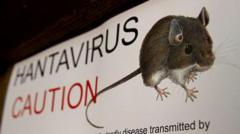Betsy Arakawa, the wife of legendary actor Gene Hackman, has succumbed to a respiratory illness attributed to hantavirus, a rare disease primarily transmitted through infected rodents. Health authorities have confirmed that Ms. Arakawa likely contracted Hantavirus Pulmonary Syndrome (HPS), a severe form of the illness that can arise after exposure to rodent droppings. Reports indicate she passed away approximately one week prior to her husband, who is currently suffering from advanced Alzheimer’s disease. The couple was discovered deceased in their New Mexico home last month, stirring concern regarding this little-known yet dangerous illness.
Hantavirus encompasses various strains typically carried by rodents, particularly deer mice in North America. Transmission to humans often occurs through inhalation of aerosolized particles from rodent urine, droppings, or saliva. Infected individuals may initially experience symptoms resembling the flu, including fatigue, fever, and muscle aches, which can progress to serious respiratory distress. The CDC states that the mortality rate escalates to around 38% if advanced respiratory symptoms manifest. The second notable illness associated with hantavirus, Haemorrhagic Fever with Renal Syndrome, predominantly impacts the kidneys and is considered even more severe.
Between 1993 and 2022, the CDC documented 864 cases of hantavirus in the United States, mainly concentrated in the western states, particularly California, New Mexico, and Arizona. The surveillance for this virus was initiated during a notable outbreak in the Four Corners region when several residents became severely ill from respiratory ailments related to hantavirus exposure. Globally, it is estimated that there are about 150,000 cases of Haemorrhagic Fever with Renal Syndrome each year, with a significant number occurring in China.
Unfortunately, there is currently no specific cure for hantavirus infections, and treatment largely revolves around supportive care for symptoms. Patients presenting severe symptoms may require intensive medical attention and specialized interventions such as intubation. To mitigate the risks associated with hantavirus, the CDC advises individuals to eliminate rodent infestations within living and work spaces, seal potential entry points in homes, and employ protective measures while cleaning rodent waste to limit exposure to airborne contaminants.


















